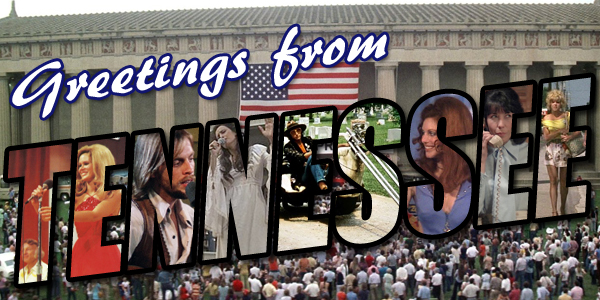
I’ve always wanted to travel across America. I’ve been a few times, to the major tourist attractions – Disneyworld in Florida, Vegas in Nevada, Cheers in Boston – but there’s so many places I’ve never seen in person, and most likely never will. Fortunately, there’s a solution, and it’s my own personal remedy to all life’s problems: movies. There’s been a movie set literally everywhere. Everywhere! So, this feature sees me cinematically visit a new state every week, through a film that was set there. You can read my journey so far here. Next up: Tennessee!
In Nashville, Tennessee, the birth-place of country music, several story arcs cross paths and words over 5 days, leading up to a big musical celebration and presidential election rally.
When I first saw and loved Paul Thomas Anderson’s Magnolia, I immediately sought after any films in a similar vein, featuring multiple disconnected characters ploughing through each others’ lives in a small space of time. This drew me to Robert Altman’s Short Cuts (and, at a later date, Paul Haggis’ Crash, which I don’t hate), a film almost as long as Magnolia – it’s one minute shorter – but which deals with what I consider to be a more diluted cast of greater number, all thrown together in a few days in L.A. My continuation through Anderson’s career led me next to Boogie Nights, which is similar to Magnolia but takes place over the course of a few years instead of 24 hours, and follows a core group of people who, for the most part, all know each other. The Altman equivalent is Nashville, which takes people from two main worlds – country music and politics – plus a few cameos and stragglers here and there, and shows what happens when they all come to a head.
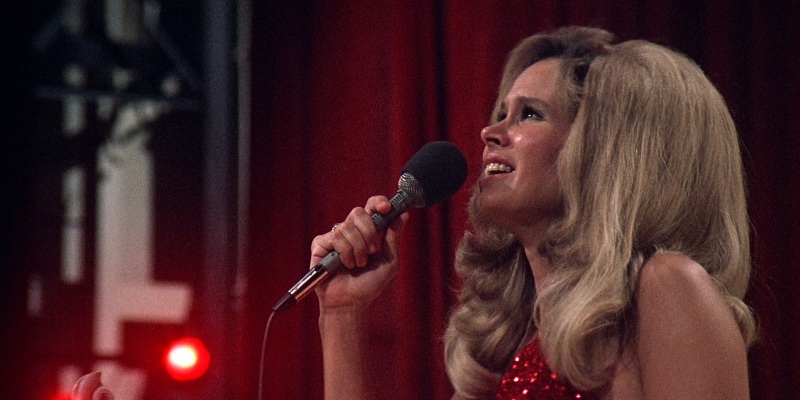
Nashville has around two dozen major characters, so I’ll run through the ones I considered more important as succinctly as I’m able: Haven Hamilton (Henry Gibson, who appears in Magnolia) is a perfectionist, intolerant country star unaware that his status is on the decline. His lawyer is Del Reese (Ned Beatty), who is married to Linnea Reese (Lily Tomlin), who sings as part of a gospel choir. Linnea has had a fling with Tom (Keith Carradine), one third of the trio Bill, Mary and Tom. Bill and Mary (Allan F. Nicholls and Cristina Raines) are married, but Mary is in love with Tom. I’ll save you some time, all the women in this film are in love with Tom. Barbara Jean (Ronee Blakley) is a hugely popular country singing star who is seen as the prize draw for some of the performances shown in the film, but unfortunately she collapses leaving the airport, and is rushed to hospital. Her husband and manager is Barnett (Allen Garfield), who arranges for Barbara’s appearances to be replaced by Connie White (Karen Black), a more glamorous rival of Barbara’s. In the same hospital as Barbara we find Mr. Green (Keenan Wynn), who is visiting his ill wife. His niece (Shelley Duvall) has come to visit but is more interested in the male musical talent present in the area. Kenny (David Hayward) is a stranger in town with a violin case who rents a room from Mr. Green. Sueleen Gay (Gwen Welles) is an attractive yet talentless wannabe star working as a waitress alongside the cook Wade (Robert DoQui). Winifred (Barbara Harris) on the other hand is talented but lacks Sueleen’s appearance, and is also very unlucky when it comes to catching a big break. She is fleeing her husband Star (Bert Remsen), who disapproves of her career aspirations. Finally, floating through this whole affair are the likes of Pfc. Glenn Kelly (Scott Glenn), a veteran of the Vietnam war, Opal (Geraldine Chaplin), a radio reporter for the BBC compiling a piece on Nashville’s musical legacy, and the unnamed, potentially mute Tricycle Man (Jeff Goldblum), who rides around from scene to scene on his giant tricycle without aim or explanation. There are some other fairly inconsequential characters floating around too, but they left so little impact with me that I can barely remember them being there amongst the crowd.
I’ve mentioned that I appreciate these kinds of sprawling, diverse films, but I think this one might have been too much. I think there are too many characters here for a film only 150 minutes long, and as such many of them don’t get a whole lot to do, hence why they’ve drifted from my memory less than 24 hours after I watched the film. Many characters, such as Pfc Kelly, Opal the reporter, Duvall’s starry-eyed fan L.A. Joan and Goldblum’s Tricycle Man, are present for to give a sense of the world than to add something to the narrative. These four in particular, as well as more minor characters like the singer Tommy Brown (Timothy Brown), or John Triplette (Michael Murphy), the consultant for presidential candidate Hal Phillip Walker, progress the story little if at all, but provide some background for the world it’s all taking place within. My problem was that with so many actors I’m not terribly familiar with, many of whom are wearing similar clothing and with similar hairstyles, I often got confused as to who was whom, and what they were doing. I spent a long time thinking Barbara Jean and L.A. Joan were played by the same actress. It’s probable that this sense of confusion is fully intentional, with Altman trying to convey a similar sense of confusion found in the American public in a post-Vietnam, post-Watergate world, but it’s now 40 years later and I’m still confused.
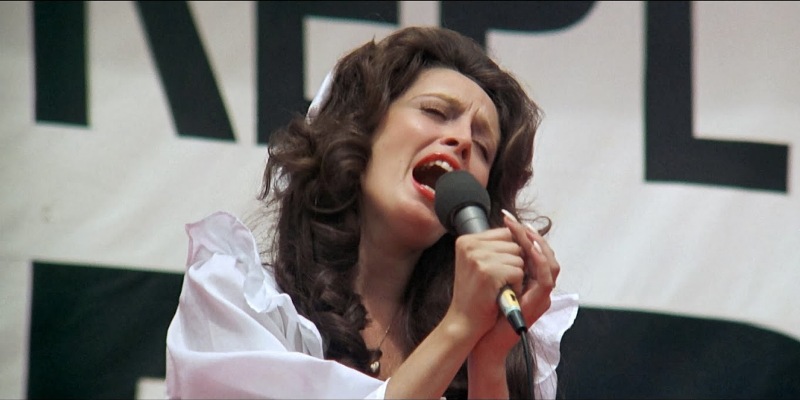
As is to be expected with the work of Robert Altman, there’s a lot of scenes in which characters talk over one another, which lends a very realistic approach to dialogue. It’s a testament to the acting, editing and sound mixing that it’s rare for an actor to be unheard or lost within these segments, so well done to everyone there. My issue was that alongside over-talking in one conversation, there are several instances where Altman chooses to cut between four or five different conversations occurring simultaneously, to further add to the confusion. There’s one such scene that feels almost entirely extractable, taking place at a small gathering at Haven’s home. There’s only one integral plot point here – Haven being propositioned with the notion of going into politics – whilst everything else is window dressing. It felt like a scene created on the spot with whichever of the actors were available that day, including a cameo-ing Elliot Gould playing himself, who was written in (as was Julie Christie for a different scene) because Altman found out he was in town that day. The camera cuts between Gould meeting some fans, Linnea Reese recounting a story to someone about an accident someone else had, Haven being propositioned and Opal (who arrived on the back of Goldblum’s tricycle, for reasons never fully revealed) interviewing Haven’s son Bud (Dave Peel) about his own aspirations outside of his father’s dominance. Needless to say, I found this whole scene thoroughly unnecessary.
There were some interesting story arcs and contrasts that I did approve of, though, particularly the two aspiring country singers looking for their big breaks, and the vastly different routes they took to end up in the same place. There was also a heavily-hinted-at sub-plot revolving around political assassination that was referenced and foreshadowed so heavily that I almost assumed it would be a red herring and no such attempt would be made.
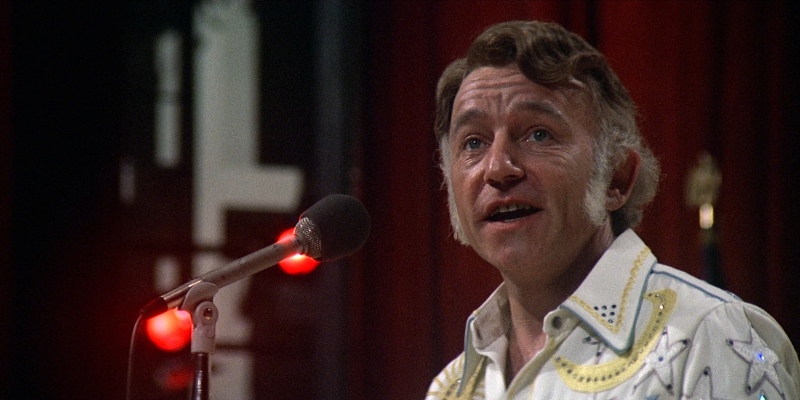
For the most part the performances are great. Two of the actresses – Ronee Blakley and Lily Tomlin – were nominated for their performances here, and both they along with Geraldine Chaplin, Barbara Harris and Henry Gibson were all nominated for Golden Globes too (with nine nominations, this film has the most Golden Globe noms in history, despite four of them being for the same category of Best Supporting Actress). Elsewhere it received awards for Best Picture and Director at both ceremonies, but the only major awards taken home were by Keith Carradine for his song, I’m Easy, which brings us neatly into the music, which is largely great.
Whilst I don’t consider myself a huge fan of country music, I do enjoy it from time to time, and I found most of the music here to be a real treat, however I could have done with a few less musical performances being played out in their entirety. Two and a half hours would have allowed plenty of time for character development and story arcs to play out for the amount of characters we have here were it not for the need to turn this into a musical. By all means hint or show snippets from songs – they are, after all, why most of the characters are where they are both geographically and fame-wise – but I didn’t need to see Ronee Blakley perform two songs all the way through in quick succession, regardless of how talented a singer she might be. The same goes for Karen Black, but then again Karen Black is not exactly a favourite actress of mine (she looks like an unfinished puppet), so she was very well cast as a character we’re supposed to dislike within moments of meeting her. I’ll allow the award-winning I’m Easy to play out, because there’s actual plot points within that performance (Carradine’s Tom dedicates the song to an unnamed person attending the performances, which could realistically be four or five of the women watching him at that moment), and the climactic It Don’t Worry Me, but everything else that plays out in full should have been cut off somewhere or led to other scenes taking place simultaneously. Some did, but most did not. I have to just take a quick moment to mention that one of the songs, Since You’ve Gone, was performed by the trio Bill, Mary and Tom, but was written by Gary Busey. Gary. Busey. I don’t know what to do with that information other than share it.
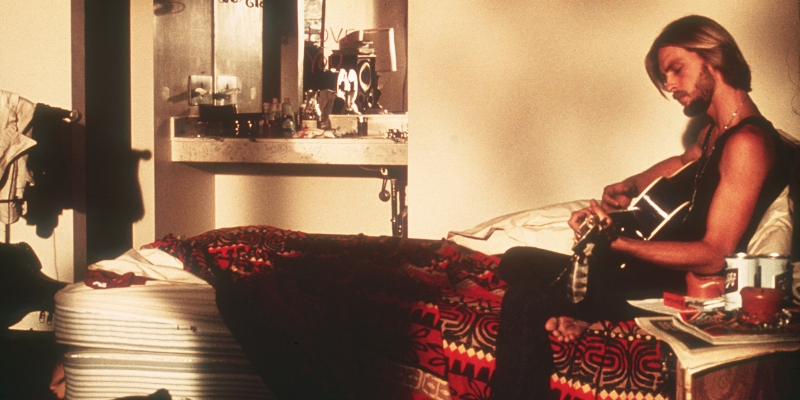
Nashville‘s musical devotion and surplus of irrelevant characters saturated what could have been an interesting and entertaining insight into the lives and world of a mid-70s America. Instead key storylines are dropped for an hour or so in favour of directionless wanderings and tedious ramblings. It’s ambitious and effectively provides a sense of the era, but as a slice of entertainment it leaves me lacking.

